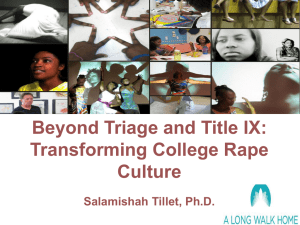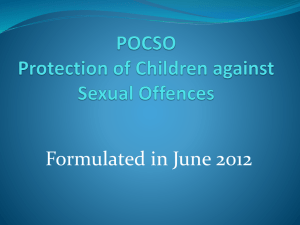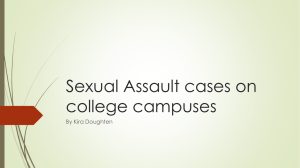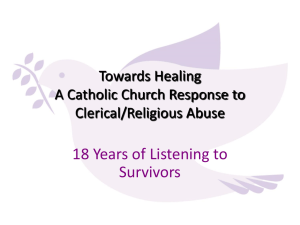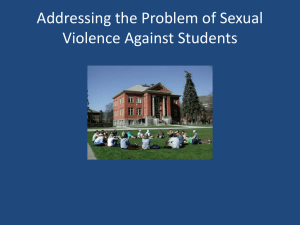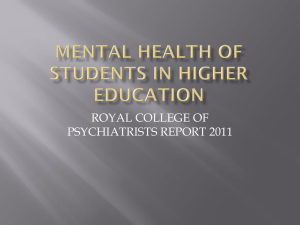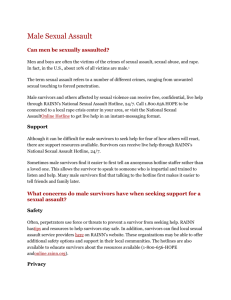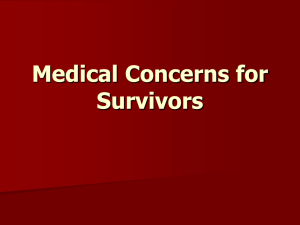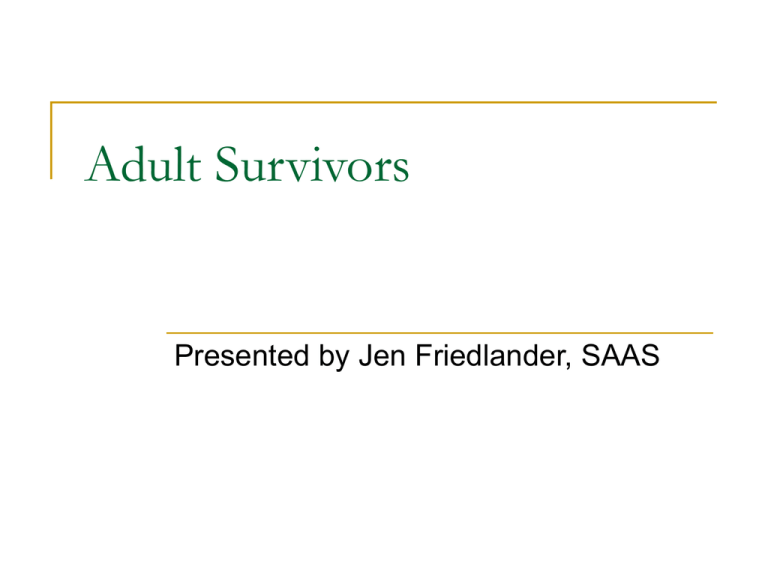
Adult Survivors
Presented by Jen Friedlander, SAAS
Adult Sexual Assault
Many people who seek services have
experienced childhood sexual abuse.
Therefore, it is important to keep in mind the
dynamics and impact of child sexual abuse.
However, their primary concern for the
call/visit may be a more recent sexual assault
or a domestic violence relationship.
Adult Survivors of Childhood SA
There are several reasons why an adult survivor of
sexual assault may also need support with
unaddressed concerns of childhood sexual abuse.
Those who have been sexually abused as children
are at greater risk for sexual assault and domestic
violence, including partner rape, as adults.
This is due to difficulty with boundaries, events that
trigger dissociation, and harmful coping
mechanisms. Sex offenders and batterers often
sense these vulnerabilities and exploit and abuse
them.
Adult Survivors of Childhood SA
A person who experiences rape as an adult may
suddenly remember previously repressed
experiences of childhood sexual abuse.
There might have been limited resources and
services available for healing.
Culturally relevant services might have been lacking.
Dynamics of Adult Sexual Assault
The dynamics of the sexual assault have
impacts that affect the healing process and
depends on many factors, including:
nature of the assault
the number of assault incidents
the relationship between the perpetrator and
the survivor
when the survivor remembers the assault
presence of a good support system
These factors all will have contributed to how the
survivor has dealt with the abuse up to the point
they contact you.
For example, a woman with a single experience of
sexual abuse by a stranger who reported the abuse
immediately and received support is likely to have
different needs than a survivor who was consistently
abused by a trusted adult and who did not
remember the abuse until they became an adult.
Effects and Coping Mechanisms
What are some reactions or behaviors adults
might experience after a sexual assault?
What are some reactions or behaviors
adults might experience after a sexual
assault?
Reactions and Common Behaviors
Minimizing
Anger
Shame
Guilt
Denial
Boundaries
Anesthesia
Trust
Unrealistic sense of
safety
Amnesia
Isolation
Dissociation
Other related issues:
Eating disorders
Sexual difficulties
Physical changes
Substance abuse
Self-harm
Suicidality
Mood disorders such as depression, anxiety,
post-traumatic stress.
Our Role
As an advocate, it may be difficult to
understand the behavior of some survivors,
but it is important to remember that these
behaviors serve as coping mechanisms and
as such function(ed) to keep the person alive.
Our role is to listen non-judgmentally, provide
information and resources, and support the
survivor’s choices.
Wrap-up
Interaction with an advocate may be the first
time the survivor breaks the sense of
isolation and begins to heal.
Options for support include individual therapy
or advocacy, support groups, somatics (body
work that incorporates wholeness and social
context), and social support from friends and
family.
Wrap-up
Working with community partners to provide
culturally relevant and competent support is
essential for child and adult survivors.
Support your agency in developing a diverse
and financially accessible referral network
and familiarize yourself with these resources.
Questions?
15 Minute Break
Effects of SA
While the effects of sexual assault vary
greatly from one individual to another,
common physical, emotional, psychological,
spiritual effects do emerge.
We are going to do an exercise which will
help us to have a clearer, more personal
understanding of the effects of victimization.
Understanding Victimization
1.
2.
3.
4.
Count off by numbers from 1-6
1. Emotional 2. Physical 3. Social 4. Sexual
5. Relational 6. Spiritual
On your post-it note, identify the impact and effects
of sexual assault according to your assigned
category. Take 10 minutes.
A volunteer from each group will share their
answers with the whole group as they post the
sticky notes on the flipchart. Each group will have
5 minutes each.
Cultural Context
We must understand that entire systems of
oppressions - sexism, heterosexism, racism,
classism, ableism, etc. – have been layered upon
survivors before they even pick up the phone or
walk in the door.
We must also look at the individual’s culture. We are
more than individuals, we all have cultures that
shape who we are, our values, how injustice impact
us, our help-seeking behavior, and our healing
process.
For example…
It is important to be open to the possibility
that the person who raped the survivor is
female. In this case, assumptions about birth
control would be inappropriate, and may
cause the survivor to feel misunderstood and
untrustworthy of you.
Issues around family involvement have
different significance depending on the
survivor’s ethnicity.
Cultural Context
It is critical to understand that gender, sexual
orientation, race, class, and ability differences
constitute the ways in which individuals define,
experience cope with and heal from rape and all
must be taken into consideration when working with
survivors.
Your sensitivity to the differing needs and choices of
survivors, depending on their culture and community
will help in their healing.
Activity: Cultural Considerations
Return to your small groups.
Handout- different “Effects of Victimization
Scenario” for each group.
Take 10 minutes to identify cultural considerations
for each survivor.
Ask for a volunteer from each group to briefly
describe the scenario and share one cultural
consideration under each of the impact categories.
Take 3 minutes.
Rape Trauma
At this time, we are going to spend some time
talking about immediate and long term
somatic, cognitive, psychological, and
behavioral stress response patterns following
sexual assault.
Following an incident (days or weeks),
many survivors report feeling:
shock
confusion
anxiety
numbness
humiliation
embarrassment
fear
self-blame
dulled senses
difficulty concentrating
hyper-vigilance
What implications could this
have for working with survivors?
Effects of Sexual Assault
Survivors may miss appointments, be late, or
not call back.
Survivors may demonstrate “bizarre”
behavior, dissociate, or avoid.
Do not take it personally; these reactions are
not about you they are in response to the
rape trauma the survivor is experiencing.
Coping Mechanisms
Long term reactions include healthy and
unhealthy coping mechanisms, which may be
beneficial (social support, activism,
expressive arts) or counterproductive (selfharm, substance abuse, eating disorders).
Effects of Sexual Assault
Advocates play a large role in normalizing
these common immediate and long term
reactions and supporting survivors in
resolving negative emotions, accessing
medical and mental health services, and
seeking social support systems.
Wrap up
Although survivors have very individual
experiences and reactions, there are
common immediate and long term effects of
trauma.
Therefore one of the most helpful things you
can do as advocates is to normalize their
feelings and let them know they are not
alone.
Questions?
Jenf@safeplaceolympia.org
(360) 786-8754 ext.114


